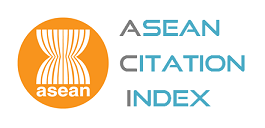THE IKIGAI SCALE ON NGUYEN TAT THANH UNIVERSITY STUDENTS: VALIDITY ASSESSMENT
Abstract
Originating from Japan, the concept of ‘ikigai’ refers to a ‘reason for living’, a ‘reason for being’ or a ‘reason for waking up in the morning’. Ikigai is a combination of four elements: what you love, what you are good
at, what the world needs, and what you can be paid for. Even though Ikigai has made its first steps into the Vietnamese culture through written media, the concept and its associations with mental health aspects in Vietnamese society have not yet been studied. Therefore, this study aimed to assess the validity of the Ikigai-9 scale and its relationships the with mental health aspects of students at a private university in Ho Chi Minh
City. A total of 2933 students participated in the research survey to self-report levels of Ikigai, well-being, self-efficacy, stress, depression, and anxiety. The findings indicated that Ikigai has a positive association with well-being and selfefficacy, and a negative association with depression, anxiety, and stress. Therefore, the study is
of significance to higher education authorities to introduce new policies to improve students’ mental health
Downloads
References
mental health service utilization by US college students: 10-year population-level trends (2007–2017).
Psychiatric Services. 2019;70(1): 60–3.
[2] Ibrahim AK, Kelly SJ, Adams CE, Glazebrook C.
A systematic review of studies of depression prevalence in university students. Journal of Psychiatric
Research. 2013;47(3): 391–400.
[3] Pham T, Bui L, Nguyen A, Nguyen B, Tran P, Vu P,
Dang L. The prevalence of depression and associated
risk factors among medical students: An untold story
in Vietnam. PloS One. 2019;14(8): 1–17.
[4] Vidourek RA, King KA, Nabors LA, Merianos AL.
Students’ benefits and barriers to mental health
help-seeking. Health Psychology and Behavioral
Medicine: An Open Access Journal. 2014;2(1): 1009–
1022.
[5] Eller R. Ikigai and higher education: A review of the
literature. AU eJournal of Interdisciplinary Research.
2016;1(2): 50–54.
[6] Kono S, Walker GJ. Theorizing ikigai or life worth
living among Japanese university students: A mixedmethods approach. Journal of Happiness Studies.
2020;2(1): 327–355.
[7] Kono S, Walker GJ, Ito E, Hagi Y. Theorizing
leisure’s roles in the pursuit of ikigai (life worthiness): a mixed-methods approach. Leisure Sciences.
2019;41(4): 237–259.
[8] Pham Thi Thanh Ha, Bui Thi Huong, Kim Bao
Giang, Pham Thanh Tung, Pham Bich Diep. Coping
strategies for academic stress among students at Ha
Noi Medical University in the academic year 2018-
2019. [Chiến lược đối phó với căng thẳng học tập của
sinh viên Trường Đại học Y Hà Nội, năm học 2018-
2019]. Journal of Medical Research [Tạp chí Nghiên
cứu Y học]. 2021;138(2): 163–171.
[9] Ngo TL. Anxiety expression of high school students
in Chuong My-Ha Noi: a situation. [Thực trạng biểu
hiện lo âu của học sinh THPT huyện Chương Mỹ
thành phố Hà Nội]. Doctoral dissertation. Hanoi:
University of Education, Hanoi National University;
2013.
[10] Trang TK. Stress, anxiety and depression among
medical students. [Căng thẳng, lo lắng và trầm cảm
ở sinh viên y khoa]. Ho Chi Minh City Journal of
Medicine. 2012;16: 355–361.
[11] Tuyen NT, Dat TQ, Nhung HT. Prevalence of depressive symptoms and its related factors among students
at Tra Vinh University, Vietnam in 2018. AIMS Public
Health. 2019;6(3): 307.
[12] Mathews G. What makes life worth living? How
Japanese and Americans make sense of their worlds.
California: University of California Press; 1996.
[13] Park Y. Sense of “ikigai”(reason for living) and social
support in the Asia-Pacific region. Behaviormetrika.
2015;42(2): 191–208.
[14] Mori K, Kaiho Y, Tomata Y, Narita M, Tanji F,
Sugiyama K, et al. Sense of life worth living (ikigai)
and incident functional disability in elderly Japanese:
The Tsurugaya Project. Journal of Psychosomatic
Research. 2017;95: 62–67.
[15] Shinmura I. Koujien (Japanese dictionary). 3rd ed.
Tokyo, Japan: Iwanamishoten; 1987.
[16] Kamiya M. Ikigai ni tsuite (About ikigai). Tokyo,
Japan: Misuzu-shobo; 1966.
[17] Mathews G, Izquierdo C (editors). Pursuits of happiness: Well-being in anthropological perspective. New
York: Berghahn books; 2008.
[18] Tanno K, Sakata K, Ohsawa M, Onoda T, Itai K,
Yaegashi Y, et al. Associations of ikigai as a positive psychological factor with all-cause mortality
and cause-specific mortality among middle-aged and
elderly Japanese people: findings from the Japan Collaborative Cohort Study. Journal of Psychosomatic
Research. 2009;67(1): 67–75
[19] Mitsuhashi Y. Ikigai: Giving every day meaning and
joy. Hachette UK; 2018.
[20] García H, Miralles F. Ikigai: The Japanese secret to
a long and happy life. UK: Penguin; 2017.
[21] Murata C, Kondo T, Tamakoshi K, Yatsuya H,
Toyoshima H. Determinants of self-rated health:
could health status explain the association between
self-rated health and mortality?. Archives of Gerontology and Geriatrics. 2006;43(3): 369–380.
[22] Okamoto K, Harasawa Y. Predictor of increase
in caregiver burden for disabled elderly at home.
Archives of Gerontology and Geriatrics. 2009;49(1):
129–131.
[23] Sone T, Nakaya N, Ohmori K, Shimazu T, Higashiguchi M, Kakizaki M, et al. Sense of life worth
living (ikigai) and mortality in Japan: Ohsaki Study.
Psychosomatic Medicine. 2008;70(6): 709–715.
[24] Imai T. The reliability and validity of a new scale
for measuring the concept of Ikigai (Ikigai-9). [Nihon koshu eisei zasshi]. Japanese Journal of Public
health. 2012;59(7): 433–439.
[25] Fido D, Kotera Y, Asano K. English translation and
validation of the Ikigai-9 in a UK sample. International Journal of Mental Health and Addiction.
2020;18(5): 1352–1359.
[26] Kumano M. On the concept of well-being in Japan:
Feeling shiawase as hedonic well-being and feeling
ikigai as eudaimonic well-being. Applied Research in
Quality of Life. 2018;13(2): 419–433.
[27] Yoshida I, Hirao K, Kobayashi R. The effect on subjective quality of life of occupational therapy based on
adjusting the challenge–skill balance: a randomized
controlled trial. Clinical Rehabilitation. 2019;33(11):
1732–1746.
[28] Fukuzawa A, Sugawar I. Social support and participation as factors relating to Ikigai and life satisfaction in
lonely older Japanese. Ageing International. 2023;8:
465–481. https://doi.org/10.1007/s12126-022-09486-
6.
[29] Health TL. Mental health matters. The
Lancet. Global Health. 2020;8(11): e1352.
https://www.ncbi.nlm.nih.gov/pmc/articles/PMC7561
290/pdf/main.pdf [Accessed 13th May 2022].
[30] World Health Organization. Depression. https://www.who.int/news-room/factsheets/detail/depression [Accessed 13th May 2022].
[31] Tran Nguyen Ngoc. The effectiveness of treatment
of generalized anxiety disorder by relaxation-exercise
therapy: An evaluation. [Đánh giá hiệu quả điều trị
rối loạn lo âu lan tỏa bằng liệu pháp thư giãn luyện
tập]. Doctoral dissertation. Hanoi: Hanoi Medical
University; 2018.
[32] Nguyen Thi Anh Thy, Vo Thi Ngoc Thuy, Mai Thu
Phuong. The relationship between role stress and
work stress. [Tác động của các yếu tố căng thẳng
trong vai trò đến căng thẳng trong công việc]. Journal
of Economic Development [Tạp chí Phát triển Kinh
tế]. 2015;26(7): 105–121.
[33] Nguyen Thao Nguyen. The relationship between job
stress and employees’ performance, motivation. [Mối
quan hệ giữa căng thẳng trong công việc và hiệu
suất công việc, động lực làm việc]. Yersin Journal of
Science [Tạp chí Khoa học Yersin]. 2020;5(1): 36–48.
[34] Luu TL. Stress, Depression and Anxiety of medical
staff at Soc Son District Medical Center, Ha Noi City,
2019: situation and related factors. [Thực trạng và
các yếu tố liên quan đến stress, trầm cảm, lo âu của
nhân viên y tế thuộc Trung tâm Y tế huyện Sóc Sơn,
Thành phố Hà Nội, năm 2019]. Doctoral dissertation.
Hanoi: Hanoi National University; 2019.
[35] Hofstede G. Contemporary issues in cross-cultural
psychology. In: Empirical models of cultural differences. Swets & Zeitlinger Publishers; 1991.
[36] Giang VM. South-East Asian culture Vs. East
Asian culture (A case study of Vietnam and Japan).
http://repository.vnu.edu.vn/handle/VNU_123/58687
[Accessed 13th May 2022].
[37] Tran TH. Some similarities and differences
in Vietnamese and Japanese cultures.
http://dlib.huc.edu.vn/bitstream/123456789/8816/1/34.-
TRAN-THI-HOA—TR501-511_Doi-dieu-cam-nhan-
.pdf [Accessed 13th May 2022].
[38] Mogi K. Ikigai: The Japanese secret to a long and
happy life. UK: Cornerstone; 2017.
[39] Tamashiro T. Ikigai philosophy. Vietnam: Van Lang
Publishing House; 2020.
[40] Stewart-Brown S. The Warwick-Edinburgh Mental
Well-being Scale (WEMWBS): performance in different cultural and geographical groups. Mental wellbeing). Dordrecht: Springer; 2013: 133–150.
[41] González-Sanguino C, Ausín B, Castellanos MÁ,
Saiz J, López-Gómez A, Ugidos C, Munoz M. Mental ˜
health consequences during the initial stage of the
2020 Coronavirus pandemic (COVID-19) in Spain.
Brain, Behavior, and Immunity. 2020;87: 172–176.
[42] Schwarzer R, Jerusalem M. In: Weinman J, Wright
S, Johnston M (ed.). Generalized self-efficacy scale.Measures in health psychology: A user’s portfolio. Causal and control beliefs. Windsor, UK: NFERNelson;1995: 35–37.
[43] Fiorenzato E, Zabberoni S, Costa A, Cona G. Cognitive and mental health changes and their vulnerability
factors related to COVID-19 lockdown in Italy. PLoS
One. 2021;16(1): 1–25.
[44] Mazza C, Ricci E, Biondi S, Colasanti M, Ferracuti S, Napoli C, Roma P. A nationwide survey of
psychological distress among Italian people during
the COVID-19 pandemic: immediate psychological
responses and associated factors. International Journal of Environmental Research and Public Health.
2020;17(9): 3165.
[45] Ahmed MZ, Ahmed O, Aibao Z, Hanbin S, Siyu L, Ahmad A. Epidemic of COVID-19 in China and
associated psychological problems. Asian Journal of
Psychiatry. 2020;51: 1–7.
[46] Harper CA, Satchell LP, Fido D, Latzman RD. Functional fear predicts public health compliance in the
COVID-19 pandemic. International Journal of Mental Health and Addiction. 2021;19(5): 1875–1888.









